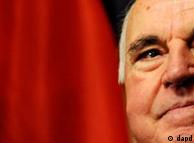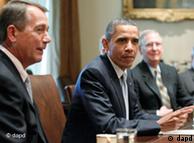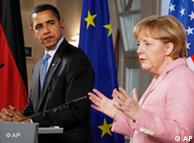Politics | 05.09.2011
Crises put leadership qualities of Obama and Merkel to the test
The leadership lashing has come from all sides. Germany's former chancellors, the conservative Helmut Kohl as well as the social democrat Helmut Schmidt have criticized what they consider a lack of European leadership in the face of the financial crisis from Chancellor Angela Merkel. Germany's first-ever foreign minister from the Green Party, Joschka Fischer, also scolded what he perceives as Merkel's failure to guide Europe through what is arguably the most severe crisis since the founding of the European Union.
Across the Atlantic, Barack Obama is not faring much better. While the steady Republican drumbeat about the president's lack of leadership can be shelved as partisan campaign rhetoric, it does reflect a growing public sentiment. According to a new Pew survey, Obama's leadership ratings have nose-dived. For the first time since he took office significantly more Americans disapprove of the way he is handling his job (49-43 percent). Since May the percentage of people describing Obama as a strong leader also has fallen from 58 to 49 percent.
Last week, the president of the AFL-CIO, the country's most important labor organization said that if Obama didn't finally take stronger action to improve the US economy, he isn't a leader, but "a follower." A headline in Salon Magazine probably best sums up the growing disenchantment of Democrats and Progressives in the US with the leadership style of their president: "Obama's dopey rope-a-dope strategy."
Lack of leadership
In Merkel's case, the prime examples for her alleged failure to lead is what critics call her inept, unprincipled and late response to the debt crisis in Europe and Germany's stance against military action in Libya, which critics charge isolated Berlin from its Western allies.
As for Obama, he is accused of essentially having been duped by Republicans in accepting a deeply flawed debt deal, having played a passive role instead of taking a strong stand against the dictators who are trying to crush their own people in Syria and Libya and most importantly of being totally absent on the most important issue for Americans, i.e. jobs.
While much of the resentment with the leadership style of Merkel and Obama is understandable, say experts, to be fair it should be measured against what other political options were available.
Unusual role
"If we look at Merkel I would say that the demands on Germany to lead are very recent," Matthias Wächter, director of the Institut Européen des Hautes Etudes Internationales (EHEI) in Nice, France, told Deutsche Welle. He adds, that until recently, Berlin was not supposed to act as a strong international leader, but rather to exercise leadership only in the context of the so called Franco-German partnership, so Germany in a way is simply not used to acting as the sole, strong European leader as many now expect.
 Germany's former chancellor Helmut Kohl issued a tough rebuke of Merkel's policy toward Europe
Germany's former chancellor Helmut Kohl issued a tough rebuke of Merkel's policy toward Europe
What's more, argues Hubert Zimmermann, a professor of international relations at Philipps University in Marburg, the grand vision and leadership for Europe that many critics now say Merkel should have provided would have to go very far and reach very deep.
Essentially it would lead to a much more centralized Europe than most of the people now calling for a grand plan would be prepared to go, says Zimmermann:
"So to call for very far-reaching European visions was relatively easy for people like Helmut Kohl when it was clear that it wouldn't be pushed through during his leadership."
Herding cats
Michael Genovese, the director of the Institute for Leadership Studies and a political science professor at Loyola Marymount University in Los Angeles, puts the calls for Merkel to emerge as the de facto European leader in a more practical context.
"For Merkel it is difficult to lead the European Union which is an organization which is still in the making and is far less organized by formal law than the United States. It's hard to lead or as we say in the US it's like herding cats," he told Deutsche Welle.
Arguably, though, her stance on Libya has weakened her position as an international leader even more than what critics call her dithering on Europe's debt crisis.
"Germany's European partners, particularly France where I live, are asking themselves what Germany is driving at, what the principles and the main lines of foreign policy are," says Wächter. "There should be a lot more clarity what Germany's objectives in foreign policy are."
Wrong lessons
Barack Obama, argue the analysts, is a similar type of political leader as Angela Merkel, as he is also a cool pragmatist who likes to weigh all the options, not an ideologue with a clear set of ideals and a more emotional approach to political issues.
Obama, says Genovese, has tried to learn the lesson from Bill Clinton's health care debacle. Clinton was personally heavily invested in every aspect of the legislation, essentially trying to dictate the policy to Congress. That backfired, health care reform failed and left Clinton deeply damaged. Obama took note of that and basically has left all legislation up to Congress instead of getting personally involved.
"I think he mislearned the lessons of recent history," says Genovese. "It's a strategic failure on his part. The lesson from Clinton no longer applies." The political system in the US is so polarized that leaving legislation to a Republican-dominated Congress ensures that nothing Obama wants to get done actually gets passed by Congress.
Sure, adds Zimmermann, Obama could have tried to act more forcefully in the debt ceiling debate and offer a riskier proposal, but that probably is also not his personal style.
Hedging bets
"Usually American presidents are careful to hedge their bets and not make risky proposals or visionary speeches," says Zimmermann and cites Ronald Reagan's famous 'Tear down this wall' statement in Berlin during the Cold War. "Of course he could say that because the people who would be upset with that were on the other side of the wall."
 Barack Obama was accused of leadership failure during the debt crisisHence, invoking earlier leaders like Helmut Kohl and Ronald Reagan to criticize the leadership of Angela Merkel and Barack Obama is understandable, but not entirely fair. First, the constant pressures and constraints Merkel and Obama face today dwarf those experienced during the Cold War by Kohl and Reagan.
Barack Obama was accused of leadership failure during the debt crisisHence, invoking earlier leaders like Helmut Kohl and Ronald Reagan to criticize the leadership of Angela Merkel and Barack Obama is understandable, but not entirely fair. First, the constant pressures and constraints Merkel and Obama face today dwarf those experienced during the Cold War by Kohl and Reagan.
"It's almost like you are Gulliver chained down by thousands of little Lilliputians," says Genovese.
Secondly, history's verdict on what makes great leaders takes time to evolve, notes Zimmermann.
"If you look at back at Reagan and Kohl, for a long time both of them were regarded as practically bumbling idiots and anything but strong leaders. The reason was of course that they also operated in a divided system. After the Cold War ended they both looked like visionary leaders."
Author: Michael Knigge
Editor: Rob Mudge

沒有留言:
張貼留言